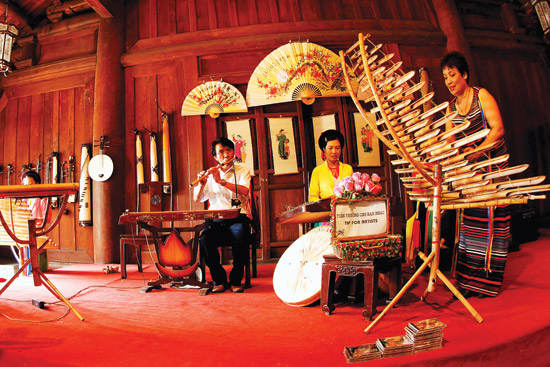(No.9, Vol.2, Sep 2012 Vietnam Heritage Magazine)
In 1956, the National School of Music was set up in Saigon. This school chiefly teaches Western music, but does include a traditional section where pupils are taught to play Vietnamese musical instruments; classes of Western music are far more popular than those in which traditional music is taught. Applications for admission to the piano courses are numerous. Applicants who fall short of the required marks are transferred to the study of the traditional section.
In recent years, however, the influence of Western music is very strong, and is usurping the important role of Vietnamese traditional music.
In Vietnam, as in all colonial countries, the power of the conqueror leads the colonized people to imitate the way of living, the outlook, the artistic, and literary style introduced by the conqueror.
Vietnam is called the most Westernized country in the Orient because of legitimate contacts with the West; some traditions are dropped, and others will change their shapes. In recent years, however, the influence of Western music is very strong and has displaced Vietnamese music.
The West displays to the Vietnamese young people its flawless instruments, its accurate notation, its varied repertoire, its orchestration, and its disciplined orchestras. In contrast, in the traditional section young people find archaic instruments, a primitive system of notation, a restricted repertoire, no orchestration, and a complete lack of discipline within the orchestra.

Photo: Pho Ba Cuong
Thus, Vietnamese music often takes on the figure of a clumsy old woman for whom one can have a certain respect, but whose company is rather boring. This inferiority complex makes it impossible for the traditional teachers to instill a high opinion of their art into a younger generation which is attracted for the most part by the bravura, and the scientific aspect of Western music. It is therefore not surprising that part of young generation, through carelessness, is neglecting their own art, an art which should be the pride of their nation. Such a state of things is to be sorely regretted.
The fact may be explained by a number of reasons, mostly psychological, social, and political difficulties. The study of Western music offers young people a prospect of being able to continue their training abroad, considerable esteem and a top rung of the social ladder. In the traditional music, musicians have difficulty in earning their living, and must have a second job if they are to make both ends meet. They never attend an international meeting to make cultural exchanges between East and West, to establish reciprocal relations with the traditional forms of music in the East and the Far East. A small number of young Vietnamese remain faithful to the tradition, but have been won by Western music richness in the domain of harmony and have tried to build it in a new orientation. This evolution takes away from traditional music its character, its originality, and leads it towards the path of hybridizing. For example, there have been traditional instruments concerts with Western orchestras.
Vietnamese music is the most independent form. The thematic and the developmental techniques of the Western composition are not commonly found in Vietnamese music. One must distinguish between a superficial understanding of both Vietnamese and Western music and learn how to apply such principles to Vietnamese music in order to produce significant composition. In both Vietnamese and Western music, scales are expendable and compositional principles. To the extent that Vietnamese music attempts to imitate the Western music ideal, it will lose its own most vital elements. In such a situation, it is doomed to eventual failure.
As a partisan of progress, and conscious of the necessity for the traditional music to evolve, I sincerely hope that the Vietnamese traditional music can adapt itself to the new conditions of modern life without affecting its essence. Every innovation in a tradition must be brought about willingly, and by crafted masters of the traditional music. It is indispensable, in my opinion, that the qualified authorities must shoulder their cultural responsibility, take steps to perpetuate the tradition. They must also review the position of the traditional musicians, foster musical research, encourage the study of traditional music, and reorganize the school of music. If Vietnamese music can maintain the interest of society, it can eventually take its rightful place in world culture. When this happens, it could provide a better living for Vietnamese musicians, and the young generation will no longer hesitate to devote themselves to the study of their own art.
But if the music cannot survive, it is safe to say that Vietnam, and indeed the world will have lost one of the greatest musical forms.
Carbondale, October 19, 1970
*Nguyen Vinh Bao Artist-musician
Former Prof. at Saigon
National Conservatory of Music -1956-1964
Visiting Prof. at Southern Illinois
University – 1970 -1972
Lute-Craftsman
Phone: 843.0454; Email: vb1908@gmail.com
Mr Bao, now 93, is living in Saigon.

